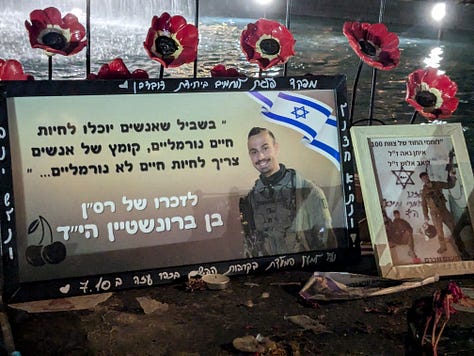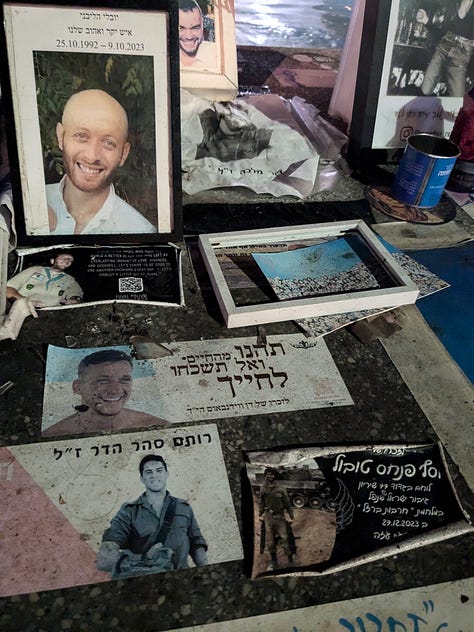I just returned from a two-week trip to Israel, and on this trip I managed to visit two of my favorite cemeteries. Yes, it’s true that while I love the people of Israel who are alive, I also have a few favorite Israeli burial places. One of them is the cemetery of Kevutzat Kinneret, which is located on the Kinneret, the Sea of Galilee, at the lower southwestern shore. (For the record, my other favorites include the Trumpeldor Cemetery in Tel Aviv, where Arik Einstein and Aḥad Ha’Am are interred, and of course the cemetery in Tzfat with all the Spanish Kabbalists.)
I particularly love the Kinneret cemetery not only because it’s a spectacularly beautiful location, built on a slight hill overlooking the water, but also because of a few of its notable long-term residents: Berl Katznelson, one of the leading lights of the Labor Zionist movement, and the person for whom Kibbutz Be’eri is named; Rahel Bluwstein, also known as Raḥel haMeshoreret, Raḥel the Poetess, perhaps best known for her poetry about the hard life of the early ḥalutzim / pioneers; and, of course, Naomi Shemer, the greatest composer of Israeli popular music, who had an essential hand in creating the sound of 20th-century Israel.
.
One of Shemer’s best-known songs, and one to which I continually return, is Al Kol Eleh, a song which many of us know well. Shemer composed it in 1980 in the wake of the tragic death of her sister’s husband, and it reflects the messiness of life: the honey and the bee-sting, the sweet and the bitter. Al kol eleh - for all these things - we are grateful*.
Like many Israeli pop songs, there are Tanakhic references in the text, and one in particular resonates at this time:
הֲשִׁיבֵנִי וְאֲשׁוּבָהּ \ אֶל הָאָרֶץ הַטּוֹבָה
Hashiveini ve-ashuvah / El ha-aretz hatovah.
Return me, and I shall surely return / To the good Land [of Israel]
The reference, which I am sure many of you recognize, is well-known in Jewish life because we say it every time we put the Torah away:
הֲשִׁיבֵ֨נוּ ה' ׀ אֵלֶ֙יךָ֙ וְֽנָשׁ֔וּבָה חַדֵּ֥שׁ יָמֵ֖ינוּ כְּקֶֽדֶם׃
Return us, Adonai, to You, And we shall surely return; Renew our days as of old.
It’s a verse from the end of the book of Eikhah / Lamentations (5:21), the next-to-last verse, which, on the evening of Tish’ah BeAv (which, BTW, is just over a month away), we repeat after chanting the last verse. It is actually a very powerful moment, because everybody sings along in the mournful tones of Eikhah trope, sitting on the floor in the half-light. In its original context, the verse speaks generally about redemption following destruction: with God’s encouragement, we shall return as a nation - to the land from which we were exiled by the Babylonians, to a state of peace and satisfaction and freedom, to a repaired relationship with the Qadosh Barukh Hu.
And of course it is worth noting that we still chant the last verse of Eikhah (5:22):
כִּ֚י אִם־מָאֹ֣ס מְאַסְתָּ֔נוּ קָצַ֥פְתָּ עָלֵ֖ינוּ עַד־מְאֹֽד׃
For truly, You have rejected us, Bitterly raged against us.
Not so nice, right? But we still say it, even though we repeat the next-to-last verse after that, to remind us that we take the bad with the good; that return is still possible even in the context of rejection.
Shemer uses it more personally: I shall surely return el ha-aretz hatovah / to the good Land, meaning that after one’s life is disrupted by tragedy and deep personal grief, my life shall return once again to normal. But of course the bee sting and the honey will always be there side-by-side; we take the pain and the sweetness together as we move through our lives. Al kol eleh - for all these things I am grateful, and through all of these things, God, shmor na li, protect me.
This is the human condition. This is the messiness of our lives.
Perhaps one of the most fascinating plot lines of the Torah includes the episode we read today of Moshe erupting in anger and striking the rock for water in Midbar Tzin (Bemidbar / Numbers 20:1-12). The Israelites are thirsty and complaining once again; God instructs Moshe and Aharon to speak to a particular rock, which will yield water to drink. But Moshe is fed up with all the grumbling, and is overwhelmed by his anger, so he lashes out at the ungrateful Israelites and strikes the rock. Water flows, but God immediately says, effectively, “Sorry, Moshe, but you did not do what I told you to do. So you will not enter Israel with the rest of the people.”
The episode is particularly troubling because it just seems so arbitrary and even petty. This is Moshe Rabbeinu, our teacher Moses, who led the people out of Egypt. For cryin’ out loud, he was up on Mt. Sinai for 40 days taking dictation from God, panim el panim, face-to-face! And for just a little bit of anger, he is barred from completing the journey?! What about second chances? What about teshuvah / repentance? What about God’s supposed forgiving nature? It doesn’t add up.
And, as will unfold in later passages, we see that Moshe is tremendously hurt by this. He pleads with God to be able to enter Israel. And we feel for him.
So perhaps there is a hint of another purpose here. What is the Torah trying to teach us?
Maybe the message is, as with Al Kol Eleh, that we take the good with the bad. Moshe never gets his wish; but on the other hand, he will always be Moshe Rabbeinu. He will always be the most beloved leader on the Jewish bookshelf. But even Moshe Rabbeinu is human, and so are we.
One of the most striking observations about my visit to Israel is that life goes on even through deep pain and anger and loss. This is a country at war, where one enemy in the north and another in the south are still targeting Israelis with rocket fire and drones and sometimes infiltration; where air-raid sirens sound every day; where there are 130,000 people displaced from their homes; where soldiers continue to fall in battle. The political fissures that have re-emerged in recent months show the fabric of Israeli society fraying; accusatory fingers are pointed in all directions. There are posters everywhere and pleading demonstrations constantly, all over the country to remind everybody of the 120 hostages remaining in Gaza. Last motza-ei Shabbat we went to the hostage vigil in Tel Aviv; there were thousands of people, including family members of hostages both on and off the stage. It was powerful and moving.
Once upon a time, a pleasant stroll through Kikar Dizengoff in the center of Tel Aviv brought the joy of people-watching and pride in a thriving city, the first contemporary Jewish city. The whole area was recently given a face-lift, and traffic patterns have been changed to discourage car traffic and encourage pedestrians and cyclists.






But two weeks ago, a Shabbat walk through Kikar Dizengoff brought me to tears. The fountain in the center has become a memorial to October 7th. It is surrounded by photos and mementos and posters and stickers created by families who lost loved ones. It is absolutely heartbreaking.
And yet, the periphery of the plaza is alive and bustling with restaurants and bars and, well, life. It’s a perfect metaphor for Israel and Israelis right now: on the exterior, we’re all OK; we’re just trying to get on with life. But our hearts are dark and heavy and in mourning. This is a society that is not well, and everybody can feel it. The beaches are crowded - mostly with Israelis, as the tourist numbers are way down - but playing in the surf is just a cover for the deep anguish which everybody feels. You cannot escape it.
Al hadvash ve’al ha’oqetz, al hamar vehamatoq. For the honey and the sting, for the bitter and the sweet. Al kol eleh. For all these things. This is the messiness of life. The grief comes with the joy. The redemption comes alongside the rejection, before and after.
My daughter Hannah is studying right now at the Alexander Muss High School in Israel, a longstanding Jewish/Israeli studies program of which I myself am an alumnus (I was there in 1987). It’s a six-week program based in Hod Hasharon, a suburb of Tel Aviv.
Although she is in a place where the likelihood (at least right now) of rockets falling is quite slim, I wanted a better understanding of the safety situation, so I downloaded to an app which gives notifications for terror activity throughout the country. Though I knew these were happening regularly, I had no idea of the frequency of attacks - which are daily in the north, sometimes with barrages of hundreds of Hizbullah rockets, and even a few which are still being launched by Hamas in Gaza. Thank God, most of them are shot down by Iron Dome, and of course they are often targeting areas that have been evacuated.
But the point on some level is to acknowledge that even through all the apparent normalcy of people going about their lives in Israel, this is not normal, and while the devastation in Gaza is far greater, nonetheless many Israelis are still suffering from this war on a daily basis. We cannot become complacent; we cannot allow ourselves to look past the actual human toll.
So we take the devash with the oqetz; we recognize that nobody can be comfortable until all the parties reach an agreement to move forward in safety and security, to bring the hostages home. Al kol eleh - for all these things, I continue to pray, and I hope to soon be grateful.
הֲשִׁיבֵ֨נוּ ה' ׀ אֵלֶ֙יךָ֙ וְֽנָשׁ֔וּבָה חַדֵּ֥שׁ יָמֵ֖ינוּ כְּקֶֽדֶם׃
***
*While the song became associated with the settler movement in the wake of the uprooting of Yamit in the Sinai in 1982, that was not Shemer’s original intent, since the song was written two years earlier.




